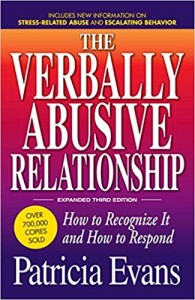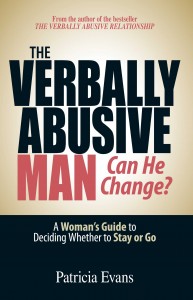Kerby Anderson offers a distinctly Christian view of this important topic. Taking a biblical perspective moves this problem from strictly emotional to its full implications for our spiritual lives.
![]() This article is also available in Spanish.
This article is also available in Spanish.
I would like to address the subject of verbal abuse for two important reasons. First, our behavior is often a great indicator of our worldview. Proverbs 23:7 says, “For as he thinks within himself, so he is.” What a person thinks in his or her mind and heart will be reflected in his or her words and actions. Verbal abuse and physical abuse result from a worldview that is clearly not biblical.
 Second, I want to deal with verbal abuse because of the incredible need for Christians to address the subject. Ten years ago I did a week of radio programs on this topic, and I have received more e-mails from men and women who read that transcript than any other article. They were grateful that I addressed the subject. Since there are some new books and web sites, I wanted to update the original article.
Second, I want to deal with verbal abuse because of the incredible need for Christians to address the subject. Ten years ago I did a week of radio programs on this topic, and I have received more e-mails from men and women who read that transcript than any other article. They were grateful that I addressed the subject. Since there are some new books and web sites, I wanted to update the original article.
Most of us know someone who has been verbally abused. Perhaps you are involved in a verbally abusive relationship. It is also possible that no one even knows your circumstances. Verbal abuse is a kind of battering which doesn’t leave evidence comparable to the bruises of physical battering. You (or your friend) may be suffering in silence and isolation.
I want to tackle this very important issue in an effort to understand this phenomenon and provide answers. First, we should acknowledge that verbal abuse is often more difficult to see since there are rarely any visible scars unless physical abuse has also taken place. It is often less visible simply because the abuse may always take place in private. The victim of verbal abuse lives in a gradually more confusing realm. In public, the victim is with one person. While in private, the abuser may become a completely different person.
Frequently, the perpetrator of verbal abuse is male and the victim is female, but not always. There are many examples of women who are quite verbally abusive. But for the sake of simplicity of pronouns in this program, I will often identify the abuser as male and the victim as female.
 One of the first books to describe verbal abuse in adults was Patricia Evan’s book The Verbally Abusive Relationship.{1} She interviewed forty verbally abused women who ranged in age from 21 to 66. Most of the women had left a verbally abusive relationship. We will use some of the characteristics and categories of verbal abuse these women describe in this book.
One of the first books to describe verbal abuse in adults was Patricia Evan’s book The Verbally Abusive Relationship.{1} She interviewed forty verbally abused women who ranged in age from 21 to 66. Most of the women had left a verbally abusive relationship. We will use some of the characteristics and categories of verbal abuse these women describe in this book.
Years later, she wrote a second book, The Verbally Abusive Man: Can He Change?{2} In that book she makes the claim the some men can change under certain circumstances. That led to the subtitle of her book, “A Woman’s Guide to Deciding Whether to Stay or Go.”
 Is there hope that some abusers can change? Yes, but the key to healing is for the person being abused to recognize verbal abuse for what it is and to begin to take deliberate steps to stop it and bring healing. Since the abuser is usually in denial, the responsibility for recognizing verbal abuse often rests with the partner.
Is there hope that some abusers can change? Yes, but the key to healing is for the person being abused to recognize verbal abuse for what it is and to begin to take deliberate steps to stop it and bring healing. Since the abuser is usually in denial, the responsibility for recognizing verbal abuse often rests with the partner.
Characteristics of Verbal Abuse
What are some of the characteristics of verbal abuse? Here is a list as outlined in The Verbally Abusive Relationship.{3}
1. Verbal abuse is hurtful and usually attacks the nature and abilities of the partner. Over time, the partner may begin to believe that there is something wrong with her or her abilities. She may come to feel that she is the problem, rather than her partner.
2. Verbal abuse may be overt (through angry outbursts and name-calling) or covert (involving very subtle comments, even something that approaches brainwashing). Overt verbal abuse is usually blaming and accusatory, and consequently confusing to the partner. Covert verbal abuse, which is hidden aggression, is even more confusing to the partner. Its aim is to control her without her knowing.
3. Verbal abuse is manipulative and controlling. Even disparaging comments may be voiced in an extremely sincere and concerned way. But the goal is to control and manipulate.
4. Verbal abuse is insidious. The partner’s self-esteem gradually diminishes, usually without her realizing it. She may consciously or unconsciously try to change her behavior so as not to upset the abuser.
5. Verbal abuse is unpredictable. In fact, unpredictability is one of the most significant characteristics of verbal abuse. The partner is stunned, shocked, and thrown off balance by her mate’s sarcasm, angry jab, put-down, or hurtful comment.
6. Verbal abuse is not a side issue. It is the issue in the relationship. When a couple is having an argument about a real issue, the issue can be resolved. In a verbally abusive relationship, there is no specific conflict. The issue is the abuse, and this issue is not resolved. There is no closure.
7. Verbal abuse expresses a double message. There is incongruence between the way the abuser speaks and her real feelings. For example, she may sound very sincere and honest while she is telling her partner what is wrong with him.
8. Verbal abuse usually escalates, increasing in intensity, frequency, and variety. The verbal abuse may begin with put-downs disguised as jokes. Later other forms might surface. Sometimes the verbal abuse may escalate into physical abuse, starting with “accidental” shoves, pushes, and bumps.
Categories of Verbal Abuse
What are some of the categories of verbal abuse? Here is a list as outlined in The Verbally Abusive Relationship.{4}
The first category of verbal abuse is withholding. A marriage requires intimacy, and intimacy requires empathy. If one partner withholds information and feelings, then the marriage bond weakens. The abuser who refuses to listen to his partner denies her experience and leaves her isolated.
The second is countering. This is the dominant response of the verbal abuser who sees his partner as an adversary. He is constantly countering and correcting everything she says and does. Internally he may even be thinking, “How dare she have a different view!”
Countering is very destructive to a relationship because it prevents the partner from knowing what his mate thinks about anything. Sometimes the verbal abuser will cut off discussion in mid-sentence before he can finish his thought. In many ways, she cannot even allow him to have his own thoughts.
A third category of verbal abuse is discounting. This is like taking a one hundred-dollar item and reducing its price to one cent. Discounting denies the reality and experience of the partner and is extremely destructive. It can be a most insidious form of verbal abuse because it denies and distorts the partner’s actual perception of the abuse.
Sometimes verbal abuse is disguised as jokes. Although his comments may masquerade as humor, they cut the partner to the quick. The verbal jabs may be delivered crassly or with great skill, but they all have the same effect of diminishing the partner and throwing her off balance.
A fifth form of verbal abuse is blocking and diverting. The verbal abuser refuses to communicate, establishes what can be discussed, or withholds information. He can prevent any possibility of resolving conflicts by blocking and diverting.
Accusing and blaming is another form. A verbal abuser will accuse his partner of some wrongdoing or some breach of the basic agreement of the relationship. This has the effect of diverting the conversation and putting the other partner on the defensive.
Another form of verbal abuse is judging and criticizing. The verbal abuser may judge her partner and then express her judgment in a critical way. If he objects, she may tell him that she is just pointing something out to be helpful, but in reality she is expressing her lack of acceptance of him.
These are just a few of the categories of verbal abuse. Next we will look at a number of other forms of verbal abuse.
Other Forms of Verbal Abuse
Trivializing can also be a form of verbal abuse. I discuss this in more detail in my article on why marriages fail.{5} It is an attempt to take something that is said or done and make it insignificant. Often the partner becomes confused and believes she hasn’t effectively explained to her mate how important certain things are to her.
Undermining is also verbal abuse. The abuser not only withholds emotional support, but also erodes confidence and determination. The abuser often will squelch an idea or suggestion just by a single comment.
Threatening is a classic form of verbal abuse. He manipulates his partner by bringing up her biggest fears. This may include threatening to leave or threatening to get a divorce. In some cases, the threat may be to escalate the abuse.
Name-calling can also be verbal abuse. Continually calling someone “stupid” because she isn’t as intelligent as you or calling her a “klutz” because she is not as coordinated can have a devastating effect on the partner’s self esteem.
Verbal abuse may also involve forgetting. This may involve both overt and covert manipulation. Everyone forgets things from time to time, but the verbal abuser consistently does so. After the partner collects himself, subsequent to being yelled at, he may confront his mate only to find that she has “forgotten” about the incident. Some abusers consistently forget about the promises they have made which are most important to their partners.
Ordering is another classic form of verbal abuse. It denies the equality and autonomy of the partner. When an abuser gives orders instead of asking, he treats her like a slave or subordinate.
Denial is the last category of verbal abuse. Although all forms of verbal abuse have serious consequences, denial can be very insidious because it denies the reality of the partner. In fact, a verbal abuser could read over this list of categories and insist that he is not abusive.
That is why it is so important for the partner to recognize these characteristics and categories since the abuser is usually in denial. Thus, the responsibility for recognizing verbal abuse and doing something about it often rests with the partner.
We have described various characteristics of verbal abuse and have even discussed the various categories of verbal abuse. Finally, I would like to provide a biblical perspective.
A Biblical Perspective of Verbal Abuse
The Bible clearly warns us about the dangers of an angry person. Proverbs 22:24 says, “Do not associate with a man given to anger; or go with a hot-tempered man.” And Proverbs 29:22 says, “An angry man stirs up strife, and a hot-tempered man abounds in transgression.”
It is not God’s will for you (or your friend) to be in a verbally abusive relationship. Those angry and critical words will destroy your confidence and self-esteem. Being submissive in a marriage relationship (Ephesians 5:22) does not mean allowing yourself to be verbally beaten by your partner. 1 Peter 3:1 does teach that wives, by being submissive to their husbands, may win them to Christ by their behavior. But it does not teach that they must allow themselves to be verbally or physically abused.
Here are some key biblical principles. First, know that God loves you. The Bible teaches, “The LORD is close to the brokenhearted and saves those who are crushed in spirit” (Psalm 34:18).
Second, deal with your feelings of guilt. You may be feeling that the problems in your marriage are your fault. “If only I would do better, he wouldn’t be so angry with me.” The Bible teaches in Psalm 51:6 that “Surely You desire truth in the inner parts; You teach me wisdom in the inmost place.” Even though you may have feelings of guilt, you may not be the guilty party. I would recommend you read my article on the subject of false guilt.{6}
A related issue is shame. You may feel that something is wrong with you. You may feel that you are a bad person. But God declares you His cherished creation. Psalms 139:14 says, “I praise you because I am fearfully and wonderfully made; your works are wonderful, I know that full well.”
A key element in this area of verbal abuse will no doubt be confrontation of the abuser. It’s important for you to realize that confrontation is a biblical principle. Jesus taught about this in Matthew 18:15-20. I would recommend that you seek help from a pastor or counselor. But I would also recommend that you gather godly men and women together who can lovingly confront the person who is verbally abusing you. Their goal should be to break through their denial and lovingly restore them with a spirit of gentleness (Galatians 6:1).
But whether you confront the abuser or not, I do recommend that you seek out others who can encourage you and support you. If the abuser is willing to confront his sin and get help, that is good. But even if he will not, your hope is in the Lord and in those who should surround you and encourage you.
Notes
1. Patricia Evans, The Verbally Abusive Relationship (Holbrook, MA: Adams Media Corporation, 1996).
2. Patricia Evans, The Verbally Abusive Man: Can He Change? (Avon, MA: Adams Media, 2006).
3. Evans, The Verbally Abusive Relationship, 81-84.
4. Ibid., 85-104.
5. Kerby Anderson, “Why Marriages Fail,” Probe, 1998, probe.org/why-marriages-fail/.
6. Kerby Anderson, “False Guilt,” Probe, 1996, www.probe.org/false-guilt/.
© 2001 [revised 2013], Probe Ministries
 Grace-based families also have messages:
Grace-based families also have messages: